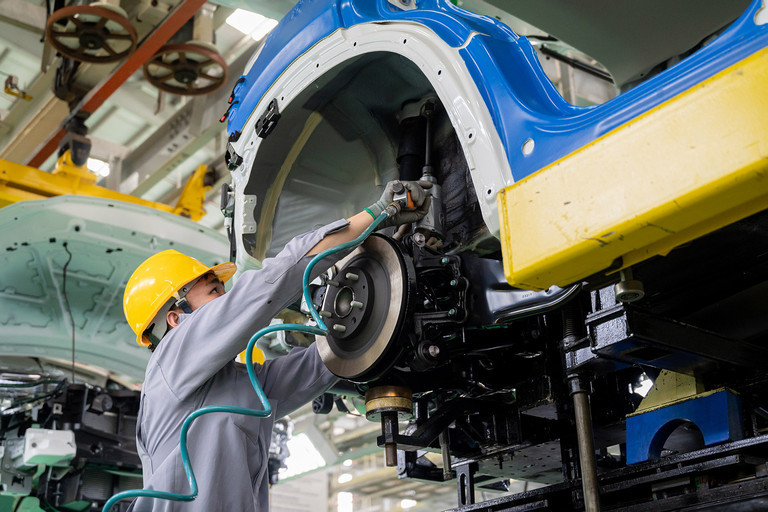
The business results of supporting industries, mechanical engineering, and automobile manufacturers were disappointing. Even Thaco, one of the largest manufacturers in Vietnam, reported 20 percent drop in revenue for 2023.
Thaco’s CEO Pham Van Tai said the group sold 96,500 cars of different kinds in 2023, a decrease of 25 percent from 2022, including 80,000 cars, 15,000 trucks and 1,500 buses and mini-buses, accounting for 36 percent of the domestic automobile market share. It also exported 2,500 products with revenue of $10 million.
Tai said the revenue from its mechanical engineering and supporting industries in 2023 was VND8.7 trillion, down 20 percent compared with 2022 because of the 30 percent fall in output. Meanwhile, export revenue was $105 million, a sharp fall of 75 percent compared with 2022.
Phan Dang Tuat, chair of the Vietnam Association of Supporting Industries (VASI), said there are 1,500 supporting enterprises, mostly operating in mechanical engineering, electrics and electronics manufacturing, plastics, rubber and chemicals.
The enterprises experienced a tough year in 2023, when average revenue dropped by 40 percent.
One of the difficulties faced by the supporting industry is that they have to borrow capital at high interest rates of 10-12 percent, which makes them less competitive compared with foreign invested enterprises. South Korean enterprises, for example, just pay interest rate of 2 percent for their bank loans.
Most Vietnamese supporting enterprises are small and medium scale. They buy input materials in small quantities at high prices, so have high input costs.
According to the Ministry of Industry and Trade (MOIT), improvements were made in the last months of 2023, but in general industrial production in 2023 recovered slowly, while enterprises had to struggle with difficulties, from high input costs to difficulties in bank loan access and high interest rates.
The presence of Vietnamese enterprises in global supply chains remains weak, while the industrial production capability has been upgraded slowly, and the connection among enterprises in the same industry and among industries has been lax.
In fact, the signs of production capability weakening turned up at the beginning of 2023 with few orders and higher input costs. The index of industrial production (IIP) in the first quarter decreased by 2.2 percent compared with the same period of the year before. The situation only got better in the last months when the government initiated solutions to help enterprises overcome difficulties.
MOIT reported that the IIP of 2023 increased by 2.3 percent over the previous year. The added value of the whole industry grew by 2.98 percent, while the figure was 3.48 percent for the manufacturing and processing sector.
However, according to MOIT’s Truong Thanh Hoai, the manufacturing and processing industry can no longer serve as the major driving force for growth as it did in previous years.
The growth rate of the industry in 2023 was the lowest in the last 10 years. The IIP and production output of many important industries, including automobile, motorbike, steel, electronics, mobile phones and textiles and garments, all decreased compared with 2022.
Tai from Thaco has proposed the building of a law on key industries. MOIT needs to draw up a plan on building the law and submit the plan to the government and the National Assembly’s Standing Committee, so that it is included in the 2024 law building program.
“We hope that MOIT will ask the government for policies on supporting enterprises to minimize risks. Leading enterprises will link with small and medium enterprises to develop the mechanical engineering and supporting industries of the country,” Tai said.
Despite difficulties, Thaco has set high goals for 2024. It plans to manufacture 112,500 products of different kinds and obtain revenue of VND13 trillion in mechanical engineering and supporting industries, including $250 million worth of exports.
A report found that the localization ratios of products in supporting enterprises in Vietnam are low, 5-20 percent in automobile manufacturing, 5-10 percent in electronics, 30 percent in footwear, 30 percent in textiles and garments, 1-2 percent in high technologies, and 15-20 percent in other mechanical engineering sectors.
Bang Duong